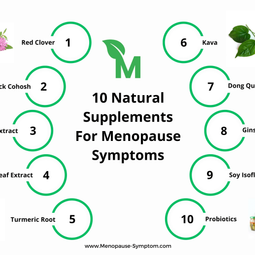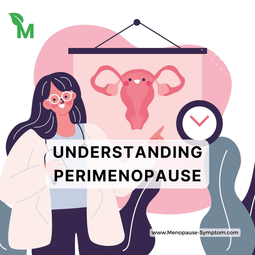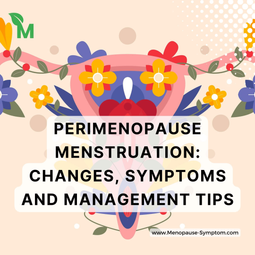The Perimenopause Puzzle: Unraveling Menstrual Mysteries
Are you experiencing unpredictable periods? Do you find yourself constantly guessing when your next cycle will begin? If you're in your 40s or early 50s, you might be entering perimenopause, a transitional phase leading up to menopause. One of the most common and frustrating symptoms of this stage is irregular menstruation. Let's dive deep into the causes of these menstrual irregularities and explore ways to manage them effectively.
What Exactly is Perimenopause?
Before we delve into the causes of irregular menstruation, it's crucial to understand what perimenopause is. This transitional phase typically begins in a woman's 40s, though it can start as early as the mid-30s or as late as the 50s. During this time, your body starts preparing for menopause, the permanent end of menstruation and fertility.
Perimenopause is like a dress rehearsal for menopause, with hormonal fluctuations taking center stage.
The Hormonal Rollercoaster of Perimenopause
Estrogen: The Leading Lady
The primary cause of irregular menstruation during perimenopause is hormonal fluctuations, particularly in estrogen levels. Estrogen plays a crucial role in regulating your menstrual cycle. During perimenopause, your ovaries start producing less estrogen, but this decline isn't steady. Instead, it's more like a rollercoaster ride with unpredictable ups and downs.
Some months, your estrogen levels might spike, leading to heavy periods
Other times, they may plummet, resulting in light or skipped periods
These fluctuations can cause your cycle to become longer, shorter, or completely unpredictable
Progesterone: The Supporting Actor
While estrogen takes the spotlight, progesterone also plays a significant role in your menstrual cycle. As you approach menopause, your body may have cycles where you don't ovulate. Without ovulation, your body doesn't produce progesterone, which can lead to:
Longer cycles
Heavier periods when they do occur
Increased risk of endometrial hyperplasia (thickening of the uterine lining)
Other Factors Contributing to Irregular Periods
While hormonal changes are the primary culprit, several other factors can contribute to irregular menstruation during perimenopause:
Stress: The Unwelcome Guest
Stress can wreak havoc on your menstrual cycle at any age, but it's particularly impactful during perimenopause. When you're stressed, your body produces cortisol, which can interfere with the production of reproductive hormones.
Remember, stress isn't just about feeling overwhelmed. Major life changes, like children leaving home or caring for aging parents, can also impact your cycle.
Weight Fluctuations: The Silent Influencer
Your weight plays a more significant role in your menstrual cycle than you might think. Fat cells produce estrogen, so significant weight gain or loss can affect your hormone levels and, consequently, your menstrual cycle.
Gaining weight can lead to excess estrogen production
Losing weight rapidly can cause a drop in estrogen levels
Both scenarios can result in irregular periods during perimenopause.
Thyroid Issues: The Hidden Disruptor
Thyroid problems often emerge during perimenopause and can significantly impact your menstrual cycle. Both hyperthyroidism (overactive thyroid) and hypothyroidism (underactive thyroid) can cause irregular periods.
When to Seek Medical Advice
While irregular periods are a normal part of perimenopause, certain symptoms warrant a visit to your healthcare provider:
Extremely heavy bleeding (soaking through a pad or tampon every hour for several hours)
Periods lasting longer than 7 days
Spotting between periods or after sex
Periods occurring closer together than 21 days
These symptoms could indicate underlying conditions that require medical attention.
Managing Irregular Periods During Perimenopause
Now that we understand the causes, let's explore some strategies to manage irregular menstruation during perimenopause:
Hormonal Treatments
Your doctor might recommend hormonal treatments to regulate your cycle:
Birth control pills can help stabilize hormone levels and regulate periods
Progesterone therapy can help balance out estrogen dominance and reduce heavy bleeding
Lifestyle Changes
Simple lifestyle modifications can make a big difference:
Regular exercise can help regulate hormones and reduce stress
A balanced diet rich in whole grains, fruits, vegetables, and lean proteins can support hormonal balance
Stress-reduction techniques like meditation or yoga can help manage cortisol levels
Natural Remedies
Some women find relief with natural remedies:
Herbal supplements like black cohosh or evening primrose oil may help regulate cycles
Acupuncture has shown promise in managing perimenopausal symptoms, including irregular periods
Always consult with your healthcare provider before starting any new supplement regimen.
Embracing the Change
Remember, perimenopause is a natural transition. While irregular periods can be frustrating, they're a sign that your body is moving into a new phase of life. By understanding the causes and exploring management strategies, you can navigate this transition with confidence and grace.
Irregular menstruation during perimenopause is primarily caused by hormonal fluctuations, particularly in estrogen and progesterone levels. However, factors like stress, weight changes, and thyroid issues can also play a role. By recognizing these causes and working with your healthcare provider, you can develop a personalized plan to manage your symptoms effectively.
As you journey through perimenopause, remember that you're not alone. Millions of women worldwide are experiencing the same changes. Embrace this transition as a natural part of your life's journey, and don't hesitate to seek support when you need it. Your body is adapting to a new normal, and with the right knowledge and care, you can navigate this change with confidence and ease.
Related Concerns
How to manage heavy periods during perimenopause ?
Which natural remedies are good for irregular menstruation in perimenopause ?
Perimenopause menstruation changes and what to expect.
Best supplements for perimenopause menstrual symptoms.
Coping with perimenopause mood swings and menstruation.
Perimenopause menstruation patterns explained.
Diet tips for managing perimenopause menstruation issues.
Exercise and its effects on perimenopause menstruation.
Perimenopause menstruation and fertility concerns.
Hormonal imbalance during perimenopause menstruation.
Source: Team MPS compiled, analyzed and wrote. Please dont reup without source of us. Many thanks.




